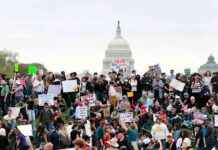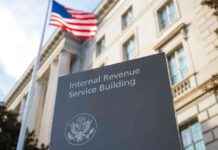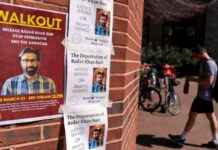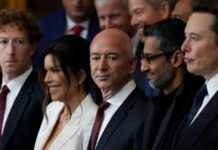Elon Musk’s Twitter Polls Shake Up Government Decision-Making
In a surprising turn of events, Elon Musk, the former CEO of Twitter/X and current head of the Department of Government Efficiency (Doge), found himself once again at the center of controversy. Musk, known for his unconventional leadership style and close ties to US President Donald Trump, recently announced a new policy that raised eyebrows across the nation.
It all started when Musk revealed that federal employees would be required to email in their weekly accomplishments, with a failure to respond resulting in automatic resignation. This decision, seen as harsh and abrupt by many, was met with swift criticism from the American Federation of Government Employees (AFGE), a union representing federal workers. The AFGE condemned the move as “cruel and disrespectful,” vowing to challenge any unjust terminations.
Despite the backlash, Musk remained firm in his stance, emphasizing that a simple response would suffice to avoid resignation. He even went as far as to suggest that those who provided satisfactory answers could be considered for promotion within the government. However, the controversy didn’t end there.
In a surprising twist, Musk decided to leave the fate of this new policy in the hands of his social media followers. Through a Twitter poll, he asked the public whether federal employees should have received the email prompting them to report their weekly achievements. This move, allowing the masses to dictate government decisions, sparked further debate and criticism online.
Reactions on Social Media
On Twitter/X, where Musk is known for his active presence and controversial statements, the poll quickly gained traction. Many users criticized the billionaire for what they perceived as a power trip and authoritarian behavior. Some questioned the practicality of expecting millions of federal employees to send in individual emails, considering efficiency is a core principle of Doge.
As the votes poured in, with over 620,000 responses at the time of writing, the results revealed a clear divide. While 76% of participants supported Musk’s policy, 23% opposed it, highlighting the polarizing nature of his decision-making process. The outcome of the poll remains uncertain, leaving many to wonder about the implications of letting social media influence government operations.
Expert Analysis
Experts in leadership and governance have weighed in on Musk’s unconventional approach to decision-making. Dr. Samantha Green, a political scientist specializing in organizational behavior, expressed concerns about the implications of relying on Twitter polls for critical government policies.
“Allowing social media followers to dictate government actions sets a dangerous precedent and undermines the expertise of professionals in the field,” Dr. Green remarked. “While public input is valuable, decisions of this magnitude should be based on thorough analysis and consultation with stakeholders.”
As the debate continues to unfold, the intersection of social media, technology, and governance remains a topic of intense scrutiny. The outcome of Musk’s Twitter poll could have far-reaching implications for the future of government decision-making and the role of public opinion in shaping policy.
In conclusion, Elon Musk’s latest foray into utilizing social media for government decision-making has sparked controversy and debate. Whether his policy of requiring federal employees to report weekly accomplishments will stand the test of public opinion remains to be seen. As the world watches and waits for the final results of the Twitter poll, the implications of this unconventional approach reverberate throughout the political landscape.
































